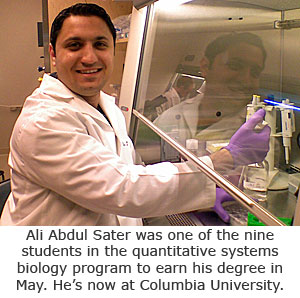

Many UC Merced students who earned their doctoral degrees in
Quantitative and Systems Biologyhave continued their success by securing positions at some of the leading labs in the world.
Quantitative and Systems Biology (QSB) is one of the top
graduateprograms on campus. Of the 12 Ph.D.s awarded during May 2010 commencement, nine of them were to students in the QSB program. Some of UC Merced’s QSB graduates are in New York, Boston, Memphis, San Francisco and Germany pursuing their careers in science.
Students in the program focus on the integration of systems at molecular, cellular, organ, organismal or ecological levels to better understand the overall function of biological systems as a whole.
“The program gave me a foundation in molecular, cell and genome biology,” said Michael DeSalvo, who earned his doctoral degree in May. “With this foundation, you can study many areas of biology, from coral reefs to fruit flies. While at UC Merced, I also learned the skills necessary to be an independent scientist capable of critical thinking and troubleshooting the many obstacles that arise during a life in science.”
DeSalvo, of Novato, is working in the Department of Anesthesia at UC San Francisco’s School of Medicine. His long-term goal is to become a faculty member with a research program focused on using molecular and cellular techniques to study coral physiology.
The following is a summary of a handful of UC Merced’s recent QSB graduates and what they’re researching.
- David Gravano, of Fresno, is at St. Jude Children’s Hospital in Memphis conducting research on the function of regulatory T cells.
- Ali Abdul Sater, of Beirut, Lebanon, is at Columbia University working in the lab of Professor Christian Schindler on type I interferon signaling and innate immunity.
- Matthew Pettengill, of Ooltewah, Tenn., is at Children’s Hospital Boston, Harvard Medical School’s primary pediatric teaching hospital. He’s determining differences in neonatal immune cell function.
- Shinichi Sunagawa, of Frankurt, Germany, is working as a postdoctoral researcher in biocomputing at the European Molecular Biology Laboratory in Heidelberg, Germany.
Sunagawa encourages graduate students to make the most of their time at UC Merced by being active in defining their interests and strengthening their skills.
“Get diverse opinions, expose yourself to different areas and define for yourself what is most useful to you,” he said.
Gravano said the program taught him the nuts and bolts of how research gets done and how science gets off the ground.
“We have all the tools needed,” he said. “You really just need to bring the dedication and drive to be successful.”






